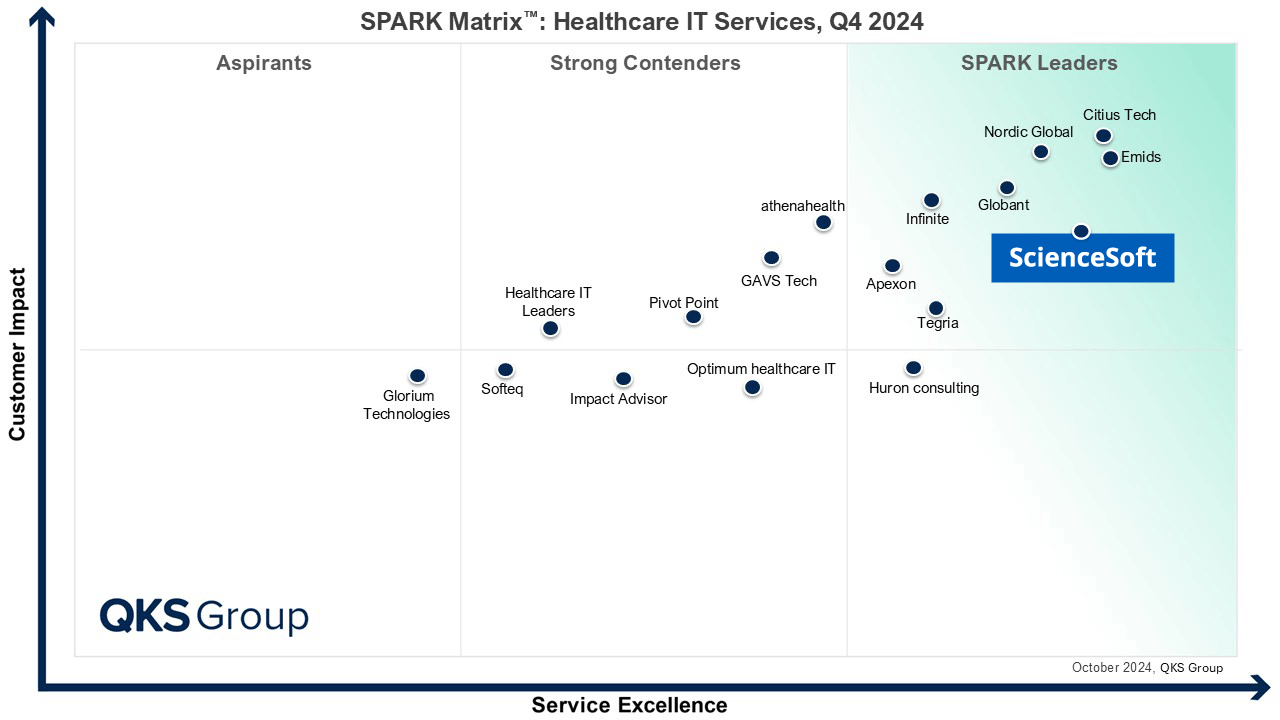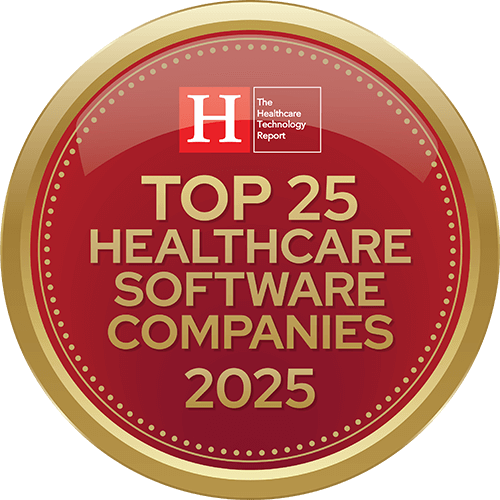Custom Chronic Disease Management Software
In healthcare software development since 2005, ScienceSoft creates custom solutions for chronic disease management, driving better patient outcomes, streamlined clinical workflows, and enhanced care coordination.
Custom Chronic Disease Management Software in a Nutshell
Chronic disease management software enables systematic care delivery and helps patients avoid complications and exacerbations. ScienceSoft creates custom CDM solutions that introduce personalized care and healthy lifestyle plans, disease-specific digital therapeutics, and gamification and patient engagement techniques.
- Key integrations: EHR/EMR, smart connected devices, RIS, LIS, e-prescribing platforms.
- Implementation time: 4–8 months on average.
- Development costs: $350,000–$800,000+, depending on the solution’s complexity and the chosen development approach. Use our cost calculator to estimate the cost for your case.
- Development ROI: 230%+, depending on the solution’s capabilities and interoperability, software maintenance and support expenses, patient engagement and treatment adherence levels, and health outcomes improvements.
Insights into the CDMS Market
By 2032, the chronic disease management app market is projected to reach $20.28 billion, with a CAGR of 10.32%. This expansion is driven by the increased adoption of mHealth technologies and personalized healthcare trends alongside the rapid integration of telehealth and RPM solutions. The growing geriatric population and escalating prevalence of chronic diseases further boost the demand for CDM apps.
Essential Features of Chronic Disease Management Software
Below, ScienceSoft’s consultants outline the key CDMS features that help providers deliver more effective care and empower patients to take an active role in managing their health.
Not Sure What Features Your CDM Solution Should Have?
We will design and implement an effective chronic disease management solution for you to drive excellence in care delivery.
Necessary Integrations for Chronic Disease Management Software

How We Develop Chronic Disease Management Software
Chronic disease management software development aims to create solutions that factor in disease-specific conditions, symptoms, treatments, and ways of patient monitoring to help healthcare providers improve patient care and outcomes. At ScienceSoft, we follow a time-tested structured approach to deliver reliable and effective CDM solutions fitting your unique needs. You set goals, we drive the project to fulfill them in spite of time and budget constraints, as well as changing requirements.
1.
Requirements gathering and solution conceptualization
We shape your solution's concept by delving into user sentiments and pain points, analyzing competitor offerings, and crafting user personas and prototypes. Our healthcare IT consultants define functional and non-functional CDMS requirements, while regulatory consultants determine software compliance needs (e.g., adherence to HIPAA, GDPR, MOHAP, FDA clearance)
2.
CDMS design
We design the solution’s architecture (microservices-based, cloud-native, containerized, etc.) and integrations (with other software, medical devices, wearables), focusing on scalability, security, and flexibility for future evolution. To ensure high user engagement and satisfaction, we design an intuitive UX and an accessible UI tailored to the needs of patients, physicians, and nurse practitioners.
3.
Agile development and quality assurance
ScienceSoft usually relies on Scrum or Kanban methodologies to develop chronic disease management systems in short iterations. We break complex projects into smaller steps with manageable deliverables to enable continuous progress tracking and agile change management based on stakeholder feedback.
We conduct functional, performance, usability, integration, and security testing in parallel with development and use pre-built components (e.g., UI elements, AI transcription and speech recognition modules) as much as possible to reduce the solution’s delivery time. This way, you can expect to get an MVP with high-priority CDM features in as little as four months.
To ensure reliability every step of the way, we rigidly follow ISO 9001, ISO 13485, and ISO 27001 protocols.
4.
Compliance review
At every SDLC stage, we ensure that your CDM solution aligns with the pertinent standards and regulations, including HIPAA, HITECH, HITRUST, ADA, and PCI DSS.
If your solution qualifies as SaMD (e.g., it features AI-based diagnostics or medication dosage calculation), it is subject to FDA 510(k), MDR, or similar regulations. In this case, we submit it to the relevant authorities for clearance.
We also prioritize adherence to healthcare data exchange standards such as FHIR, DICOM, HL7, LOINC, ICD-10, CPT, and XDS/XDS-I, ensuring interoperability and seamless communication across healthcare systems.
Our awards and partnerships

Featured among Healthcare IT Services Leaders in the 2022 and 2024 SPARK Matrix
Recognized for Healthcare Technology Leadership by Frost & Sullivan in 2023 and 2025
Named among America’s Fastest-Growing Companies by Financial Times, 4 years in a row

Top Healthcare IT Developer and Advisor by Black Book™ survey 2023
Recognized by Health Tech Newspaper awards for the third time (2022, 2023, 2025)

Named to The Healthcare Technology Report’s Top 25 Healthcare Software Companies of 2025
ISO 13485-certified quality management system
ISO 27001-certified security management system
Investments and ROI of Custom CDMS Development
Average costs for building custom chronic care management software vary between $350,000 and $800,000+, depending on the solution’s complexity and the chosen development approach. Below are sample price ranges for CDMS development projects:
$350,000–$500,000
For a CDM solution featuring PHI management, medication adherence tracking, symptom monitoring, and appointment scheduling.
$500,000–$800,000
For a solution with condition-specific functionality, EHR/EMR integration, and comprehensive patient data analytics, including AI-powered personalized lifestyle recommendations.
From $800,000
For a solution with several condition-specific modules, advanced functionality (e.g., ML-powered identification of patterns in patient data), and multiple integrations with healthcare systems (e.g., EHR/EMR, LIS, RIS) and smart devices.
The expected solution ROI exceeds 230% and hinges on solution capabilities and interoperability, software maintenance and support costs, patient engagement and treatment adherence rates, and improvements in health outcomes.
Market-Available vs. Custom CDM Solutions
In today's market, you'll find a multitude of off-the-shelf chronic disease management platforms, each with its unique features, customization options, and pricing structures. However, none of them is one-size-fits-all, so in certain scenarios, custom development may be more feasible. We have chosen to compare custom CDM software with three market-available solutions for chronic disease management.
|
|
Omada Health |
Propeller Health |
Welldoc |
Custom CDM solution |
|---|---|---|---|---|
|
Basic CDM capabilities
?
Remote condition monitoring, medication adherence tracking, educational resources for patients, and telehealth tools for communication with providers. |
|
No audio/video consultations — only messaging. |
|
|
|
Specialized CDM capabilities
?
Specialized functionalities for managing specific chronic conditions. |
For cardiometabolic and musculoskeletal diseases, behavioral disorders. |
For respiratory diseases, primarily asthma and COPD. |
For cardiometabolic diseases and mental disorders. |
Can be tailored to any chronic condition based on your requirements. |
|
Integrations
?
Connecting the solution to other systems for seamless data exchange. |
Via APIs: EHR systems, telehealth and e-prescribing platforms, connected devices, population health management tools. |
Via APIs: EHR systems, e-prescribing platforms, RPM tools, connected devices, population health management tools. |
Via APIs: EHR systems, telehealth and e-prescribing platforms, connected devices, labs, population management tools, mental well-being and sleep support solutions. |
Can be integrated with any required custom and OOTB solutions, including legacy software and smart devices. |
|
Payment and insurance
?
Verifying healthcare insurance or using payment gateways to pay for medical services. |
Third-party payment processing services. Insurance reimbursement (Medicare, Medicaid, private), self-pay options. |
Third-party payment processing services. Insurance reimbursement (Medicare, Medicaid, private), self-pay options. |
Third-party payment processing services. Insurance reimbursement (Medicare, Medicaid, private). |
Custom payment gateways, third-party payment processing services. All possible insurance reimbursement methods, including the self-pay options. |
|
Security
|
AWS-based cloud (public), end-to-end data encryption, role-based access control; PCI, ISO 27001, NIST, and HITRUST CSF standards. |
AWS-based cloud (public), end-to-end data encryption, role-based access control; HITRUST CSF standards. |
Public/private cloud, SHA-256 encryption at rest and TLS 1.2 during transmission, role-based access control, SIEM, IPS, and IDS systems; HITRUST CSF standards. |
Customized security measures based on the client’s requirements to ensure full protection of sensitive health and personal data. |
|
Regulatory compliance
|
HIPAA, SOC 2 |
HIPAA, GDPR |
HIPAA, GDPR, CCPA, 11 510(k) FDA clearances for diabetes functionality. |
Compliance with all required global, regional, and industry-specific regulations (HIPAA, HITECH, ONC, FDA, MDR, IVDR, GDPR, etc.). |
|
Platform availability
|
Web, mobile (iOS, Android). |
Web, mobile (iOS, Android). |
Web, mobile (iOS, Android). |
Covers any required platforms, including web, desktop (Mac, Windows, Linux), and mobile (iOS, Android). |
|
Investments
|
From $70,000 to $120,000 per 100 users/year. Additional fees: initial setup costs + customization and integration costs. |
Upon request to the vendor. Expect to pay the initial setup fees + configuration, customization, and integration fees + licensing fees that depend on the number of software users. |
From $120,000 per 100 users/year. Additional fees: initial setup costs + customization and integration costs. |
From $350,000. An unlimited number of users. No additional fees. |
CDMS Consulting and Implementation with ScienceSoft
- Practice-proven solution architecture designed by healthcare IT experts with 9–20 years of experience.
- Flexible cloud-native implementation adapted to your needs, IT environment, and time and budget constraints.
- Quality and security guaranteed by ISO 9001, ISO 13485, and ISO 27001 certifications.
- Compliance with HIPAA, HITECH, FDA, FTC, NCPDP, OCR, GDPR, MDR, IVDR, MOHAP, and ADA requirements.
- Cohesive and accurate patient data across IT systems thanks to the integration with EHR/EMR and connected medical devices.
- Smooth user experience due to carefully designed user journeys and accessibility features.
- Advanced disease-specific features leveraging AI/ML, IoT, AR, and other cutting-edge technologies.
- Adherence to healthcare data exchange standards (e.g., FHIR, DICOM, HL7, LOINC, ICD-10, CPT, XDS/XDS-I).
About ScienceSoft
Based in McKinney, TX, ScienceSoft is a global IT consulting and software development company. We have 20 years of experience delivering highly reliable and efficient healthcare solutions, including those for managing chronic conditions. In our projects, we use a mature quality management system supported by ISO 13485 and ISO 9001 certifications as well as a robust ISO 27001-certified security management system.







